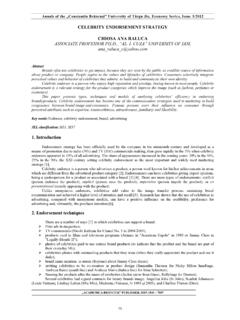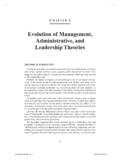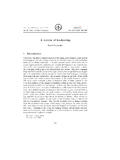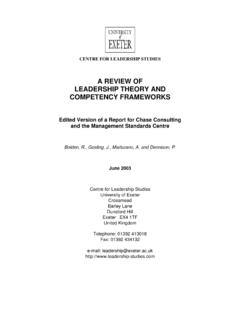Transcription of SIMILARITIES AND DIFFERENCES BETWEEN …
1 Annals of the Constantin Br ncu i University of T rgu Jiu, Economy Series, Issue 2/2012 ACADEMICA BR NCU I PUBLISHER, ISSN 1844 7007, Rating CNCSIS Type B+, code 652 Indexed in these international databases: IDEAS, Genamics JournalSeek Database, EconPapers, EBSCO and Cabell'sSIMILARITIES AND DIFFERENCES BETWEEN MANAGEMENT AND LEADERSHIPVIRGIL POPOVICI,STUDENT PHD, UNIVERSITATEA VALAHIA DIN TARGOVISTE, ROMANIAA bstract:Management is the process of setting and achieving organizational goals through its functions: forecasting, organization, coordination, training and is: the ability to influence, to make others follow you, the ability to guide, the human side of business for "teacher". Interest in leadership increased during the early part of the twentieth century. Early leadership theories focused on what qualities distinguished BETWEEN leaders and followers, while subsequent theories looked at other variables such as situational factors and skill considerations emphasize aspects that separate management of leadership, calling them twocompletely different words manager and lider are very often used to designate the same person who leads, however, they represent different realities and the main difference arises form the way in which people around are difference BETWEEN being a manager and being a leader is simple.
2 Management is a career. Leadership is a calling. A leader is someone who people naturally follow through their own choice, whereas a manager must be obeyed. A manager may only have obtained his position of authority through time and loyalty given to the company, not as a result of his leadership qualities. A leader may have no organisational skills, but his vision unites people behind and management are two notions that are often used interchangeably. However, these words actually describe two different is the main component of change, providing vision, and dedication necessary for its realization. Leadership is a skill that is formed by education, experiences, interaction with people and inspiring, of course, practice. Effective leadership depends largely on how their leaders define, follow and share the vision to is just one important component of the directing function. A manager cannot just be a leader, he also needs formal authority to be words: management, leadership, manager, leader, Clasificare JEL: M40, M41I.
3 Considerationson management and is the process of setting and achieving organizational goals through its functions: forecasting, organization, coordination, training and monitoring-evaluation. Management focuses primarily on the administrative aspects of a business leader and leadership is a process of influence BETWEEN leader and team members, aiming at achieving common goals."To manage" means: to manage, take control, coordinate, used to achieve the goal, to be wary of employees, to have interest in all aspects of business, "Manager" is one who: has subordinates, provides directions to any action, is the decision maker in anyendeavor. "Leader" is one who: is acceptance of others (and their consequences), is a reference (model), who guides."Management" means: the management, direction and control of something or someone, executive ability, the technical or academic activity "teacher".Multiple meanings and definitions of data by different theorists and practitioners of management time, Here are some: Frederick W.
4 Taylor defined management in his book Shop Management, published in 1903, as "knowing what people want to do and supervise them to make this the best way and cheapest "Henri Fayol, in his bookAdministration Industrielle et general, published in 1916, stated that" given the means to provide, organize,command, coordinate and control "More recently, management is defined as: the 's opinion, expressedin November 1969 in Harvard Business Review, management is" the manager operates the three elements of 126 Annals of the Constantin Br ncu i University of T rgu Jiu, Economy Series, Issue 2/2012 ACADEMICA BR NCU I PUBLISHER, ISSN 1844 7007, Rating CNCSIS Type B+, code 652 Indexed in these international databases: IDEAS, Genamics JournalSeek Database, EconPapers, EBSCO and Cabell'sfundamental -, ideas, things and people -; making the other objectives "Peter Drucker believes that management isequivalent to" people management ", the term" management "is just a euphemism for" chief ".
5 "The main andperhaps the only task is to mobilize energy management unit for meeting known and defined tasks", and test success, says Drucker, is to "achieve high efficiency and adapt to external changes.""A guide (to lead) means: to show the way, method, to influence, to persuade, to model."Leadership" is: the ability to influence, to make others follow you, the ability to guide, the human side ofbusiness for "teacher".Leadership is "the ability to influence some persons and groups, directing their efforts in completing organizational objectives" [1]We find in everyday life that some people are following others for various reasons known only to them. Ifwe start from a simple example, met in organizing an event, a conference, we find a person holding a series of so -called qualities of leadership, can tell others what to do and simultaneously give them respect, but also to earn their many theories assume that the capacity for leadership is inherent that great leaders are born, not made.
6 These theories often portray great leaders as heroic, mythic and destined to rise to leadership when needed. The term "Great Man" was used because, at the time, leadership was thought of primarily as a male quality, especially in terms of military leadership. Learn more about the great man theory of in some ways to "Great Man" theories, trait theories assume that people inherit certain qualities and traits that make them better suited to leadership. Trait theories often identify particular personality or behavioral characteristics shared by leaders. If particular traits are key features of leadership, then how do we explain people who possess those qualities but are not leaders? This question is one of the difficulties in using trait theories to explain in leadership increased during the early part of the twentieth century. Early leadership theories focused on what qualities distinguished BETWEEN leaders and followers, while subsequent theories looked at other variables such as situational factors and skill levels.
7 While many different leadership theories have emerged, most can be classified as one of eight major types:Contingency theories of leadershipfocus on particular variables related to the environment that might determine which particular style of leadership is best suited for the situation. According to this theory, no leadership style is best in all situations. Success depends upon a number of variables, including the leadership style, qualities of the followers and aspects of the theoriespropose that leaders choose the best course of action based upon situational variables. Different styles of leadership may be more appropriate for certain types of theories of leadershipare based upon the belief that great leaders are made, not born. Rooted in behaviorism, this leadership theory focuses on the actions of leaders not on mental qualities or internal states. According to this theory, people can learnto become leaders through teaching and leadership theoriessuggest that the ideal leadership style is one that takes the input of others into account.
8 These leaders encourage participation and contributions from group members and help group members feel more relevant and committed to the decision-making process. In participative theories, however, the leader retains the right to allow the input of theories, also known as transactional theories, focus on the role of supervision, organization and group performance. These theories base leadership on a system of rewards and punishments. Managerial theories are often used in business; when employees are successful, they are rewarded; when they fail, they are reprimanded or punished. Learn more about theories of transactional theories, also known as transformational theories, focus upon the connections formed BETWEEN leaders and followers. Transformational leaders motivate and inspire people by helping group members see the importance and higher good of the task. These leaders are focused on the performance of group members, but also want each person to fulfill his or her potential.
9 Leaders with this style often have high ethical and moral in the field have associated from the beginning the leadership with the capacity of a person to lead, existing in this sense four true statements:a. To lead you have to influence Where there are leaders there are people who follow Leaders tend to come forth especially in times of Leaders always know what they want to achieve and first conclusion that has to be remebered is that leaders have and should have skills to influence beliefsand feelings of of the Constantin Br ncu i University of T rgu Jiu, Economy Series, Issue 2/2012 ACADEMICA BR NCU I PUBLISHER, ISSN 1844 7007, Rating CNCSIS Type B+, code 652 Indexed in these international databases: IDEAS, Genamics JournalSeek Database, EconPapers, EBSCO and Cabell'sBeing a leader is a personal thing, but not all managers can be leaders or all leaders can be are better made by managers and good things are made by is undeniable that the terms management and leadership are highly interrelated, very often being usedinterchangeably.
10 Concerns about explaining and understanding the phenomenona of leadership have emerged in the early 1900s, the first studies of (1904) on the characteristics of successful terms of the first concerns about the phenomenon of leadership, they focused on personal characteristicsof successful leaders, continuing listing the functions and activities that the leader meets. Nowadays, the phenomenon of leadership is appreciated as a complex group dynamics process, meaning a dynamic process of organizing and coordinating a group, in a specific organizational context in order to undertake tasks or goals. For example, the phenomenon called leadersip manifested mainly in the army (Alexander the Great, Genghis Khan, etc.), or in communities in certain circumstances (Moses), religious (Jesus, Buddha, Mohammed, etc.). And today is manifested in different areas: state politics, sport, business etc. The main area in which the manifestation of lidership is wanted is business. In the activity of an organization they met with the conclusion thatthe implications of the phenomenona "TEAM" and "LEADER" brings about a superior performance.
















